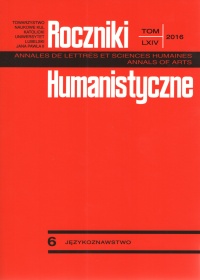Between routine and inventiveness. On the official choice of surnames in the inter-war Poland
Abstract
This article is a linguistic description of an official practice – of social and legal nature – held in the inter-war Poland under which the civil servants chose surnames for citizens whose parents remained unknown. Thus, the researched problem area represents an interdisciplinary area between administrative law and language studies (particularly onomastics and sociolinguistics). The authors focus on the semantics of the surnames in question in order to determine the potential preferences on the part of the civil servants as for some particular structural patterns of surname creation. Acting pursuant to the relevant legal acts, the civil servants avoided granting ridiculing or belittling surnames, even though some surnames of their choice did refer to animal onomastics, e.g. Koza [goat], Koziołek [baby goat], Pająk [spider]. Some of the analysed surnames tried to portray the sad circumstances of the life of their bearers, e.g. Zagiński [related to the adjective zaginiony: lost, missing]. Another frequent practice was to use the surname of the legal custodians or other people who happened to take care of an unknown child, even though at times the new name only partly reflected the original surname of the custodian, e.g. Migulski (the custodian’s name was Miguła). Jewish children were granted surnames related to their cultural environment. The predominant suffix used in the surnames under analysis was -ski. The civil servants respected the surname geography, as borne out by the fact that in Eastern provinces of the inter-war Poland they often used names in -owicz//-ewicz, -ko and -uk. The analyses presented in the article helped reveal the fact that the choices made by the inter-war civil servants oscillated between the routine (as in reaching for the names of the legal custodians, referring to onomastic stereotypes as represented by the dominant formative -ski etc.) and the inventiveness (creating alluding names like Jakubowski, Starańska, Borkowski and the like).
References
Abramowicz Z.: Słownik etymologiczny nazwisk Żydów białostockich, Białystok 2003.
Antroponimia Polski od XVI do końca XVIII wieku: wybór artykułów hasłowych oraz wykazy nazwisk z chronologią i geografią, t. I-V, red. A. Cieślikowa, Kraków 2007-2015.
Bystroń J.S.: Nazwiska polskie, Lwów 1927.
Cieślikowa A.: Antroponimia Polski od XVI do końca XVIII wieku, „LingVaria” 2006, nr 1, s. 95-103.
„Dziennik Ustaw Rzeczypospolitej Polskiej” 1926, nr 72, poz. 413 (online: isap.sejm.gov.pl).
„Dziennik Urzędowy Ministerstwa Spraw Wewnętrznych” 1927, nr 36, poz. 325; 1928, nr 4, poz. 43; 1935, nr 36, poz. 191) (online: jbc.bj.uj.edu.pl).
Kaleta Z.: Nazwisko w kulturze polskiej, Warszawa 1998.
Kodeks Cywilny Królestwa Polskiego (prawo z roku 1825), oprac. J. Walewski, Warszawa 1872 (online: bc.wbp.lublin.pl).
Malewicz S.: O pochodzeniu nazwisk żydowskich na ziemiach wschodnich, „Poradnik Językowy” 21(1925), s. 111-113.
Rymut K.: Nazwiska Polaków. Słownik historyczno-etymologiczny, t. I: A-K, Kraków 1999.
Rymut K.: Nazwiska Polaków. Słownik historyczno-etymologiczny, t. II: L-Ż, Kraków 2001.
Sas-Wisłocki J.: Ochrona prawna nazwiska, Warszawa 1939.
Słownik nazwisk używanych w Polsce na początku XXI wieku, oprac. K. Rymut, Kraków 2003 (wersja CD).
Szulowska W.: Imiennictwo dawnej ziemi halickiej i lwowskiej, Warszawa 1992.
Wilkoń A.: Nazewnictwo w utworach Stefana Żeromskiego, Wrocław 1970.
Wolnicz-Pawłowska E.: Antroponimia łemkowska na tle polskim i słowackim: XVI-XIX wiek, Warszawa 1993.
Wolnicz-Pawłowska E.: Pogranicze wschodnie, w: Polskie nazwy własne, red. E. Rzetelska-Feleszko, Warszawa–Kraków 1998.
Woźniak E.: Socjolingwistyczne aspekty zmiany nazwisk w okresie międzywojennym, „Onomastica” 60(2016), s. 119-135.
Zarębski R.: Rola czynników ideologicznych i językowo-kulturowych w procesie zmian nazwisk, „Rozprawy Komisji Językowej Łódzkiego Towarzystwa Naukowego” 60(2014), s. 313-326.
Copyright (c) 2016 Roczniki Humanistyczne

This work is licensed under a Creative Commons Attribution-NonCommercial-NoDerivatives 4.0 International License.





